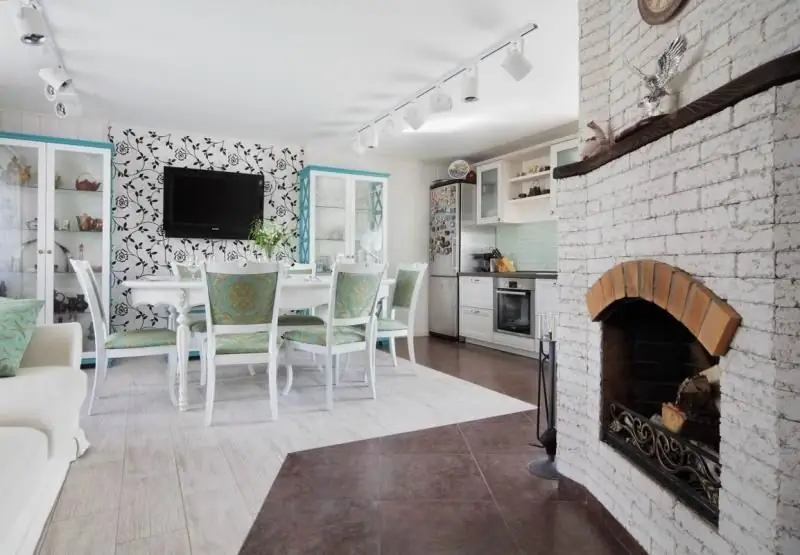
Table of contents:
- Author Bailey Albertson albertson@usefultipsdiy.com.
- Public 2024-01-17 22:26.
- Last modified 2025-01-23 12:41.
Scandinavian style interiors - lightness, naturalness, simplicity
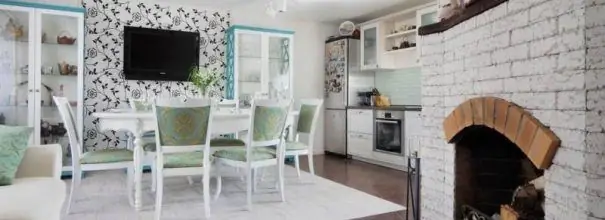
If happiness had shape and weight, then Northern Europe would become its main exporter. Indeed, despite the harsh climate, tough pricing and tax policies, residents of Finland, Denmark, Iceland, Norway, Sweden are constantly leading the "happiness ratings". What makes them so cheerful and calm? Well-arranged life - reliable and comfortable housing, decorated in a slightly conservative, moderately original, homely, cozy and warm Scandinavian style.
Content
-
1 Scandinavian style in the kitchen interior
- 1.1 Colors
- 1.2 Materials and texture
- 1.3 Video: tips for creating a Scandinavian interior
- 1.4 Advantages and disadvantages
- 1.5 Video: Scandinavian style kitchen overview
-
2 Combining Scandinavian aesthetics with other styles
2.1 Photo gallery: Scandi style kitchens - 50 interesting designs
-
3 Scandinavian kitchen decoration
- 3.1 Finishing the kitchen space
- 3.2 Video: 5 rules for creating a scandi kitchen
- 4 Reviews
Scandinavian style in the kitchen interior
Scandi style in the interior of a kitchen or kitchen-living room is, first of all, simplicity. Residents of Northern Europe are not chasing luxury, but prefer accessibility, rational distribution of space, convenience and tranquility.
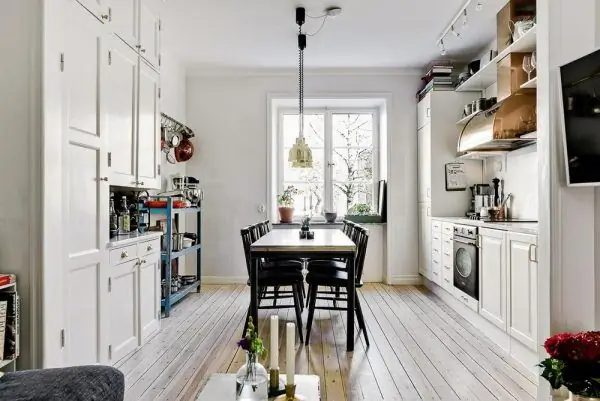
Northern residents do not have a craving for pomp and wealth, so the Scandi style in the interior looks simple, but tasteful
An inexhaustible source of Scandinavian style is the Nordic character of the Vikings, love of sunlight and respect for nature. There is no cluttering of space here. Air and natural light are the main allies of the interior.
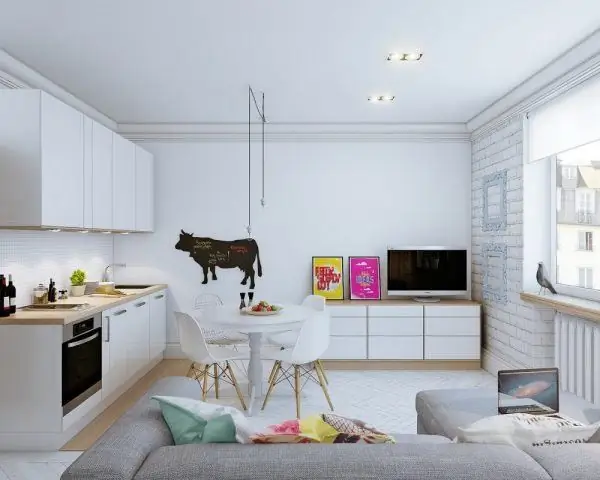
Protracted dark winters have left their mark on the arrangement of the premises, so white color and an abundance of light prevail in them.
Color spectrum
Winters in Scandinavia are long, so a light color palette helps to compensate for the lack of sunlight:
-
white colors are basic, well reflecting the sun's rays, due to which they visually increase the space and give elegance to the interior;

Classic color combination White background is the basis of Scandi style, without which the interior will never be truly Scandinavian
-
red, black, gray, dark blue are the main auxiliary gamut, which is most often found in textiles, although creative designers use these nuances for finishing furniture, for example, countertops, once again emphasizing the purity and sophistication of style.

Charging energy of red A bright red quartz countertop acts as an accent to pastel colors.
However, the Scandi style can be bright. Other colors are not alien to him - marble patterns of stones, shades of a coniferous forest, shine of sunlight, used in pastel colors for facing, and in juicy colors for picturesque accents.
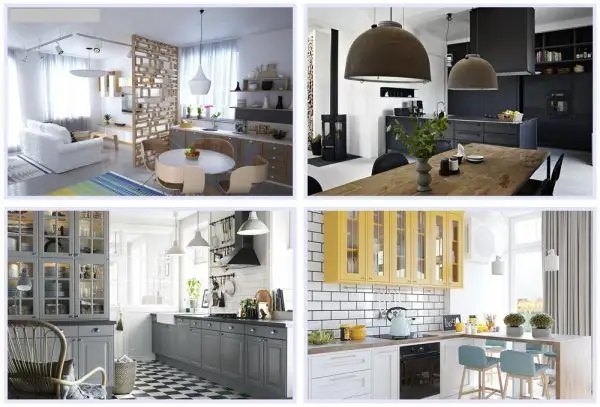
The familiar white-gray, white-black or completely white Scandinavian interior is no longer the ultimate truth, today designers recommend choosing other colors for a variety - fashionable powdery, yellow, blue, green and turquoise
Materials and texture
The main requirement for materials is their naturalness, environmental friendliness and pleasant texture. Scandinavians adore wood, which is why it is present everywhere - on walls, floors, ceilings, furniture and accessories. As a rule, minimally processed with a well-defined natural pattern.
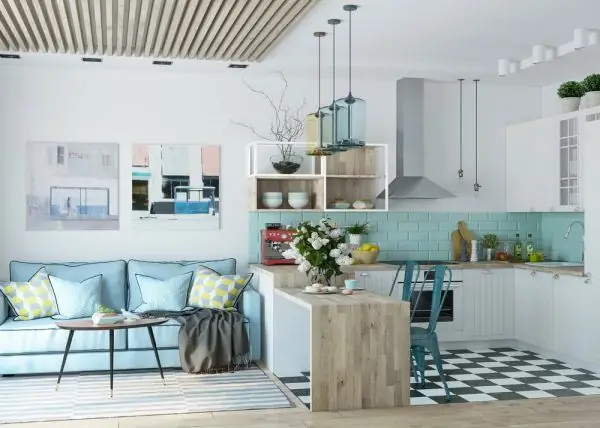
The Scandi style uses materials typical of Northern Europe and, first of all, wood in all forms, from floorboards to forest driftwood.
When using metal (chandeliers, door handles, legs of chairs and tables), preference is given to aluminum, which, due to its matte finish, fits perfectly into the interior.

Scandinavian designers skillfully combine wood and metal, thereby creating weightlessness of elements
Scandi also does not shy away from glass, natural stone, cotton, flax, fur, leather, linen, ceramics - these materials are widely used in Scandinavian style.
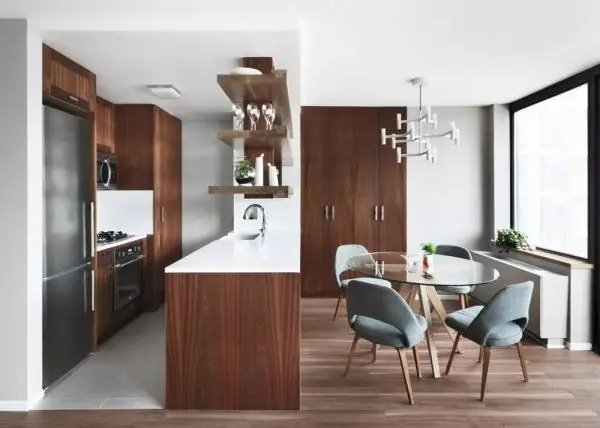
A popular material for the Scandinavian style is glass, which creates the feeling of a lake surface, for which the Scandinavian countries are rich.
Video: tips for creating a Scandinavian interior
Advantages and disadvantages
The Scandinavian style can be characterized as minimalism with a brutal Nordic content, which makes it popular in many countries.
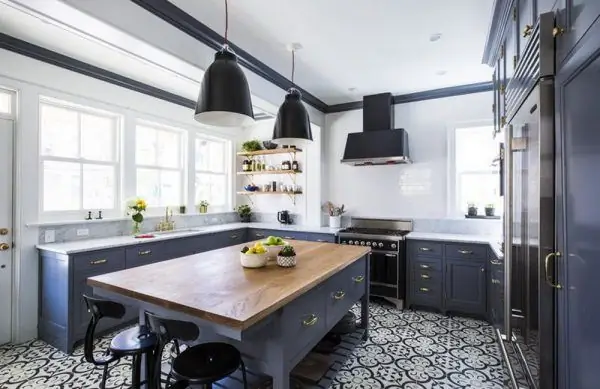
Scandi interior organically combines the characteristic features of the past and the trends of today
Its main advantages:
-
The warmth that natural materials provide, in particular, fabrics - wool, burlap, linen - warming, giving comfort and peace.

The warmth of scandi kitchen finishes The coldness of the northern nature is compensated by a large number of diverse textiles - from coarse wool to bright rugs and napkins that create a feeling of warmth and comfort
-
Functionality. There is mostly little furniture in the kitchen, but in order to save space, it is equipped with spacious drawers, shelves, etc.

Minimum furnishings In the Scandi style, you do not need to clutter up the room with a lot of decoration, so as not to create unnecessary weight.
-
Pastel colors. Soft colors trap light in the house. Shaded corners provide a smooth transition from one room to another, creating the appearance of a single space. An additional plus of light cladding is that it is an excellent background for paintings, stickers, photographs.

Scandi kitchen in pastel colors In the Scandi style, pastel colors prevail, but it is white that unites all parts of the interior into a single whole, hides inconsistencies and reflects the sun's rays, filling the room with light
-
Low cost. Scandinavian-style kitchen design, due to its simplicity, will withstand the budget of any family. Antique furniture and luxury accessories are not required here, although they are also appropriate. For the most part, simple modern furniture is used, preferably with a matte finish, wicker, and sometimes plastic.

Small kitchen scandi A Scandinavian-style kitchen will seem spacious and modern, and it won't cost much to finish.
-
Environmental friendliness and nothing more. The descendants of the Vikings clearly divide the interior into main and auxiliary. For example, an armchair will become a wonderful backdrop for a colorful blanket, whitewashed floors or wood-like laminate for a rug or skin, and a snow-white windowsill for flowering plants.

Optimal scandi entourage There is nothing superfluous in scandi - a minimum of decor, furniture is only the most necessary, but at the same time the situation does not seem empty, and any decorative object has a practical purpose
Cons of the Scandinavian style:
-
White soils, which must be present. Although there will be no difficulties with modern detergents, you will have to do it more often.

White furniture Classic Scandinavian style in the kitchen manifests itself in white furniture, walls and ceilings, as well as light wooden floors.
-
Excessive "sterility" of the white interior. But this is easy to fix by keeping whites to a minimum and replacing them with powdery, ivory, light lavender, etc.

Scandi in other colors The combination of light finishes and wooden facades of the kitchen set with dark decorative elements and bright ceramic tiles on the backsplash allows you to create a modern, but at the same time cozy and practical interior
Video: Scandinavian style kitchen overview
Combining Scandinavian aesthetics with other styles
Among the variety of interior styles, there are directions that seem to have been created for each other. Such a tandem is easy to embody in kitchen design, the main thing is to immediately highlight the dominant line (color palette, decoration and furniture), and use the second as an accent, stylizing accessories and decor items for it.
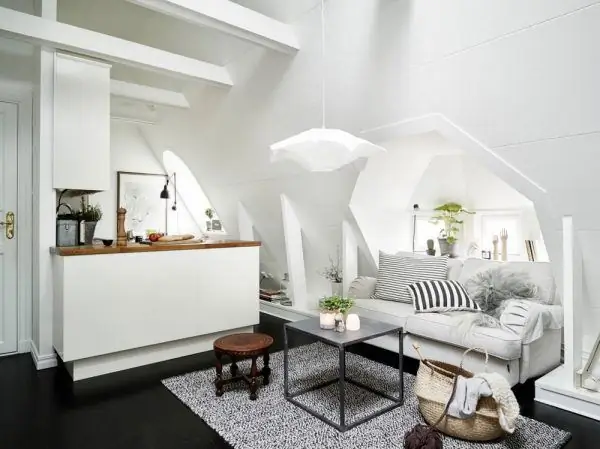
The Scandinavian style initially contains elements from different directions: it borrows the traditionalism of the classics, the simplicity of minimalism, the functionality of constructivism and the warmth of village motives
The neutrality of the Scandinavian style makes it possible to combine it with many designs, such as:
-
minimalism is perhaps the most successful combination, where the angularity is muffled by natural materials and practical furniture;

Scandi style in the spirit of minimalism In the interior decoration of the premises, the Scandinavians are guided by the principle of minimalism - the less the better
-
Provence, although at first these two styles seem incompatible, nevertheless, when decorating a kitchen, studio or kitchen-living room, the dominant Scandinavian trend is perfectly complemented by sofas, decor and Provence textiles;

Scandi with elements of Provence Scandi and Provence have in common a craving for nature, space, natural materials, simplicity, soulfulness and living plants in the interior.
-
country, natural motives, vintage furniture and romantic flair of which soften the strict Scandi style;

Scandinavian style with country elements In a scandi kitchen with country elements, there must be a massive wooden table, preferably without a tablecloth, comfortable wooden chairs, greens in pots and good lighting
-
ethnic trends - a catchy embodiment against the background of white walls of animalistic (leopard) prints, national patterns and other decor;

Ethnic motives in scandi cuisine The abundance of natural materials in Scandinavian interiors allows you to combine this trend with ethnic motives
-
retro style;

Scandi kitchen with retro elements Vintage items create a special Scandinavian atmosphere
-
a loft where industrial rudeness is inspired by soft Scandinavian motives;

Signs of a loft in Scandinavian design Black accessories - the basis of the attic style - give the scandi interior a strict and at the same time refined character
-
and, of course, hygge, which translates as “comfort that brings happiness”, is a Danish style in which the status of the environment does not play a role, but on the contrary, the more modest the surroundings, the higher the level of happiness.

Scandi style in Danish version Old but pleasant little things will help to combine scandi with hygge: a grandmother's mirror, a battered toy or photographs from the past, which will become the basis of a cozy interior
Photo gallery: Scandi style kitchens - 50 interesting designs
-

Retro scandi - Scandinavian style and retro originated almost simultaneously, so they go well with each other
-

Unusual chandelier - Volumetric shades - wooden, metal or glass create good lighting in a scandi kitchen
-

Scandi style crystal - Powder pink finish and crystal bring in a lot of light and make the kitchen airy
-

Chalk board in the kitchen - Chalk board is an indispensable element of a loft, which is often found in Scandinavian interiors.
-

Accent wall in the kitchen - Decorating an accent wall is a common technique when arranging a scandi kitchen
-

Bright accents - In the Scandinavian interior, there are bright blotches - pillows, carpets, lampshades and even black walls against the background of snow-white furniture and cladding
-

Scandi materials - The most popular finishing material in the Scandinavian style is wood, which is present in the interior everywhere.
-

Kitchen zoning - Dividing the kitchen space with flooring and bar counter is an effective method of zoning
-

Scandi style main color - The main color of the scandi style is white, while one of the design features is a contrasting or tinted room decoration
-

Use of textiles - When decorating a Scandi kitchen, it is important not to overdo it: Scandinavians are minimalists, therefore they never overload the situation with unnecessary details.
-

Bright decor in the scandi kitchen - Bright stripes, paintings, prints, pillows, huge decorative panels and chandeliers can be used as colorful accents.
-

Monochrome colors - Scandi is inherent in monochrome, which manifests itself in the use of the dominant color in different tones
-

Scandi functionality - Scandinavian-style interiors have everything you need for a comfortable stay
-

The practicality of the environment - Scandi has many hidden niches and open shelves with exposed decorative elements
-

Sunlight admission into the room - There should be no rich decor on the windows, curtains and curtains are absent or made of light material and moved slightly to the side
-

Scandi's picturesque cuisine - Scandi in a modern version is not alien to bright colors that endow the room with strong energy
-

Kitchen decoration - Scandinavian cuisine is easily recognizable by its white headset, neutral finish, beautiful open shelves for dishes, a snow-white island with mismatched chairs and an atmosphere of spaciousness that soars even in a small room
-

Scandi style kitchen interior - Following the principles of scandi, you can create a bright, uncluttered kitchen, where it will be pleasant to spend time
-

Ceiling arrangement - Beams on the ceiling are a decorative element in the interior of a scandi kitchen, which often serve as a support for lighting fixtures
-

Unusual accent - Gloss white is a win-win option for a kitchen set, which can be complemented by creative decor
-

Light gray kitchen - The use of gray colors is an excellent alternative to white - it mutes the sterility of the room and is not so easily soiled
-

Colors and shades - Monochrome kitchen does not mean monotonous, in scandi you can combine various materials, shades, textures and textures
-

Brick wall - Part of the brick walls can be left without finishing, which is often practiced in the work area, where the brickwork acts as an apron
-

Kitchen furnishings - Wooden, simple-shaped furniture should be strong and solid even in appearance
-

Artificial lighting - When creating Scandinavian lighting, you need to combine several types of lamps to provide powerful natural light.
-

Scandi style small kitchen - In northern kitchens, there is not too much decor, as Scandinavians prefer simple and functional things.
-

Light colors in the interior - In Scandinavia, there is no sunlight for a long time, but this natural disadvantage is compensated for by the light colors of furniture and finishing materials.
-

Principles of the Scandinavian style - The Scandinavian style does not have strict frames, it can be strict, bright, minimalistic, picturesque and creative - black objects create a fantastic contrast in a snow-white kitchen
-

Scandi interior laconicism - The interior of the kitchen in the Scandinavian style is very laconic, and all things have functionality - it turns out beautifully if there are not only dishes on the open shelves, but also decorative items
-

Scandi style windows and doors - Window and door structures should be wooden, and the walls of the Scandinavian-style kitchen are often sheathed with clapboard
-

Interior details - The main condition for scandi is the observance of the color combination and the absence of fancy decorations.
-

Interesting lamps - Gold-colored lamps perfectly enliven the Scandi-style interior
-

Kitchen island - If the size of the kitchen allows, then a massive table is placed in the center, where the storage systems for kitchen utensils are located
-

Dining group - In scandi, it is worth combining modernist furniture with vintage items - furniture in the dining room is usually wooden or plastic in a retro style
-

Comfortable monochrome - White, black, gray and other colors typical of Scandinavian design are neutral, they do not put pressure on the person, give him a feeling of freedom
-

Design ideas - You can add a twist to the kitchen interior using unusual lamps and an original accent wall.
-

Craving for natural light - One of the most important elements of a Scandinavian-style interior is natural light, for which large windows are installed and the room is filled with vintage lamps
-

Comfortable kitchen-living room - A practical and modern option is a scandi-style kitchen-living room, which should be well lit and decorated in accordance with the overall interior
-

Juicy shades in the interior - Saturated, juicy shades are necessary for a Scandinavian interior, without bright "spots" the kitchen furnishings will seem insipid and boring
-

Unusual decor - Open wiring serves as a kind of decor in the Scandi style, which makes it akin to an industrial loft
-

Tendency towards minimalism - Scandinavian style has a modest character and tends towards minimalism, however, scandi is more lively than minimalism, in which there is no place for accessories and you need to hide all kitchen utensils
-

Metal objects - Metal objects get along well with wood and stone, and their shape reminds that the Scandinavian style is always a little ironic
-

Eclectic Scandi style - Scandinavian interiors allow for some eclecticism - the skin of an animal will go well with minimalistic furniture, and a vintage chest of drawers, chairs and unusual lamps on cords will emphasize light walls and accentuate attention
-

Various furnishings in scandi - Scandinavian furniture is simple, light, comfortable, in which various combinations of wood, glass and stone surfaces, closed and open shelves vary
-

White finish - Part of the walls in the kitchen can be painted white, the other can be covered with a decorative panel in the form of white brick or finished with ceramic tiles in the same white color.
-

Apron decoration - The design of the apron allows you to beautifully and practically equip the work area, in scandi the most fashionable options are acceptable - white brick, hog tile or wall panel made of mirrored white glass
-

Scandinavian style glass - Scandi welcomes a lot of glass, as the entire Scandinavian interior is built on the play of light and shadow, and rare and weak rays of the sun should be used to the maximum
-

Kitchen scandi design - Scandinavian design carries a positive, lightness and conciseness, it allows the use of a small set of accessories and household items in the kitchen interior
-

Actual colors of Scandinavian textiles - The modern Nordic interior is laconic, but at the same time multicolored, textile details also meet this requirement - they have a simple design and texture combined with a spectacular color scheme
-

Blue kitchen - In order for the kitchen not to become like the palaces of the snow queen, you can pick up blue furniture that will go well with the light decoration of the room.
Scandinavian style kitchen decoration
The Scandi philosophy is to make life as comfortable as possible. Therefore, the Scandinavians prefer simple things and forms.
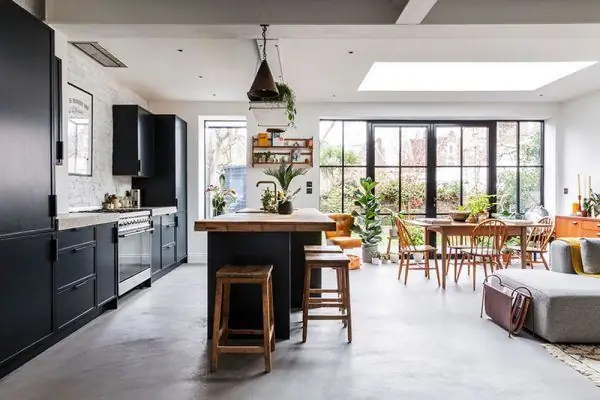
The Scandinavian style is very popular all over the world, because it was created primarily for people, and not for image or status
When arranging a scandi kitchen, you need to adhere to the principles of style:
-
Monochrome with the obligatory use of white color scheme in all its variants.

Monochrome scandi style A monochrome interior does not imply an exclusive combination of black and white, it can be based on any shade, both in combination with other colors and with your own tones
-
An abundance of light. Diverse light sources help not only make up for the lack of natural light, but also zone the space. Mirrors, chrome and glossy parts are welcome.

Abundance of light in the kitchen-living room The main feature of the Scandinavian style is the abundance of natural light, so the windows should be large and not intricate so that sunlight penetrates the room as much as possible.
-
Laconicism. Geometric shapes and strict lines must be seen in cladding, furniture and decor.

Laconic furnishings The simplicity of the lines in the scandi interior does not overload the space and makes the room lighter
-
Closeness to nature. Natural materials are often the main accent and decoration of the interior.

Natural materials in scandi Natural materials, vibrant color accents and live plants in pots on floors, tables or walls save you from the gloom and dullness of a long winter
-
Functionality. In Scandi style, everything is thought out to the smallest detail. Hidden storage systems make it possible to create a northern interior even in the smallest kitchens.

Thoughtfulness in the design of the kitchen The main feature of scandi is functionality, therefore, in the constant struggle for light and space, each piece of furniture should have the maximum number of functions.
Kitchen space decoration
Despite its simplicity and unpretentiousness, the Scandinavian style does not tolerate negligence and negligence in design. Therefore, whenever possible, you need to use natural materials, and with a limited budget - very high quality substitutes.
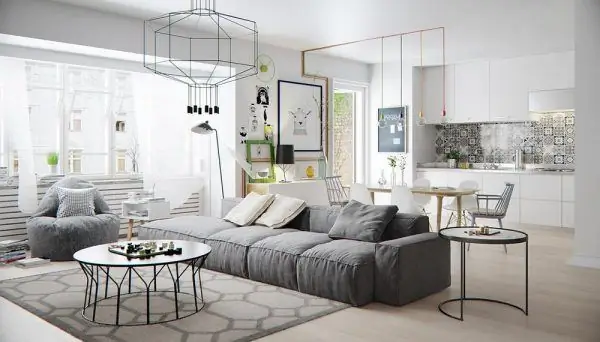
In combined kitchens, it is much easier to equip a scandi interior, the main thing is to beautifully shade the room, which can be done in one color scheme of different saturations or play with contrasts
Registration methods:
-
Space layout. Scandinavian style is versatile. It emphasizes the size of a spacious room and visually expands small rooms. In combined kitchens, it is much easier to equip a scandi interior. The main thing is to beautifully shade the premises, emphasizing the delineation of space. And for small kitchens, Scandinavian design offers a number of original solutions:
-
accented window openings;

Use of space under windows The space under the window can be extended by a small tabletop or dining area
-
white on white;

Scandi completely white kitchen White color scheme will help to create additional volume due to illuminated details, glare surfaces and different textures of the materials used
-
light in the form of decor.

Additional lighting in the form of decor Unusually shaped floor lamps, chandeliers, sconces, original lighting, ordinary incandescent lamps hanging on a cord, etc. act in the Scandi style not only as sources of illumination, but also as decor
-
-
Walls. Various wall decoration is one of the zoning tools. There are no refinements in scandi, so walls can be:
-
cover with plaster;

Plaster walls Scandinavian-style finishing is austere - light plaster is ideal for walls
-
paint;

Painted walls Monochromatic wall painting in muted tones is widespread in scandi interior, which allows you to get as close as possible to naturalness and simplicity.
-
lay out with stone or brick, followed by painting in white or a contrasting tone;

Brick accent wall An accent wall in a scandi interior is a key factor due to which you can hide the visual imperfections of a room and create a separate seating area
-
paste over with wallpaper, which the Scandinavians use extremely rarely, since climatic conditions do not contribute to this;

Wallpaper in scandi kitchen Scandi style loves geometry, so it is preferable to choose wallpaper for the kitchen with a pattern in the form of triangles, rhombuses, patchwork or hexagons, although plant motifs are quite acceptable in the form of an accent
-
sheathe with wood, clapboard or panels.

Paneling Wall panels can be used for a visual effect in Scandi style, especially since modern models have unlimited designs and a high level of sound absorption.
-
-
Floors. Scandinavian-style floors often serve as an accent, which is why, if necessary, they are decorated in contrasting colors, leaving a high baseboard to match the walls. Used as flooring:
-
natural boards are an expensive option, but they are as close as possible to the original, therefore, a restored wooden floor is much better than a newfangled laminate;

Plank flooring Light wood floors are very common in Scandinavian interiors
-
parquet of any shape;

Parquet in scandi kitchen The best option is to choose a parquet board for a scandi kitchen - due to its special texture, texture and color scheme, it is perfect for creating a "warm floor"
-
laminate, which is often used in conjunction with tiles, thus dividing the work area and dining area;

Laminate in the kitchen For a Scandinavian interior, a sharp contrast between floor and walls is considered unacceptable.
-
ceramic tiles imitating stone, wood, with a pattern or in a striking black and white version, possibly with a brushed effect to give the interior a vintage look.

Floor ceramic tiles Often, the floor in a scandi kitchen is tiled, but linoleum is never used.
-
-
Ceiling. In a scandi kitchen, the ceilings are designed to emphasize the lightness of the interior. That is why they are made smooth painted or bleached, although clapboard and suspended structures are often used, but always matte.

Ceiling decoration Ceilings in a Scandinavian kitchen must be plain, white or in light shades of gray and blue, which add a sense of spaciousness and better distribute light fluxes
-
Furniture and appliances. The main requirement for scandi kitchen furniture is discreet design and convenience, which is why all household appliances are located in the working area. A table of any shape is selected depending on the dimensions of the room. A countertop made of natural solid wood gives the kitchen a special comfort and warmth, however, a structure made of chipboard or plastic with imitation of stone or wood is suitable as a budget option. You can replace the table in a small kitchen with a bar counter, which will serve as an element of zoning. Kitchen appliances are mostly open, so modern models in metal cases are welcome. As for the faucets, it is a matter of taste - any options are possible, as in principle for sinks - modern or retro.

Scandi style furniture and appliances When choosing furniture, it is better to give preference to simple geometric shapes - a straight or corner kitchen made of natural wood with metal fittings will perfectly fit into the interior, and built-in appliances will complete the Scandinavian design
-
Kitchen set. The most common color for kitchen units is glossy white or matte. Other colors are often used, especially when they decorate the kitchen with hygge - an analogue of scandi. A feature of the Scandinavian design is the open top shelves, on which beautiful dishes are displayed. But the opposite option with upper sections to the ceiling is also appropriate, which visually increases the height of the room. The handles are pressing mechanisms, rails, staples. The set is complemented by a dining table with mismatched chairs and compact sofas, as well as a white or eye-catching colored apron made of tiles in the spirit of patchwork, mosaic and tempered glass.

Kitchen set option Modular and transformable furniture is relevant for the scandi kitchen, which takes up a minimum of space, looks stylish and elegant, but at the same time is very practical
-
Lighting. Diverse, abundant lighting is a characteristic feature of the Scandi style. Any lamps are appropriate - from a simple incandescent lamp to spot LEDs in a headset and a crystal chandelier above the dining table.

Scandi style lighting A striking touch for the Scandi style - separation of lighting groups and careful calculation of the direction of light flux - the use of general light, bright illumination and a light accent above the table create a cozy atmosphere in the room
-
Textile. Scandinavians choose bright textiles to set off the whiteness of the interior. Striped rugs, skins, pillows, towels, aprons and napkins with geometric patterns and knitted woolen blankets are used. Windows are usually not curtained, but if desired, blinds, roller blinds or long curtains of a simple cut made of light materials are used.

Scandi kitchen textiles Tulle, ruffles, multi-layered heavy curtains in scandi are inappropriate, maximum - simple very light curtains framing the window with vertical folds
-
Decor and accessories. To decorate the kitchen, they usually use:
- posters and paintings in the dining area;
- deer horns;
- photos;
- plants in pots;
- stylish ceramics;
- Wall Clock;
-
figurines and chalk boards with inscriptions.

Decor and accessories Wall decoration with original posters, children's drawings, family photos, deer figurines and other accessories makes the Scandi-style kitchen space less technological, lively and warm
Video: 5 rules for creating a scandi kitchen
Reviews
Undoubtedly, many people like the Scandinavian style. But we must not forget that the mentality of the inhabitants of Northern Europe is not the same as ours, and if white is a joy to them, then our compatriots may feel its abundance of stuffiness. Therefore, handle white with care. Use it as an auxiliary one, and make the dominant one another light color scheme that will fill the space with freshness and light. Good luck to you.
Recommended:
The Interior Of The Kitchen And Living Room In The Style Of Minimalism: Examples Of Design, Choice Of Colors And Materials, Decoration, Photos
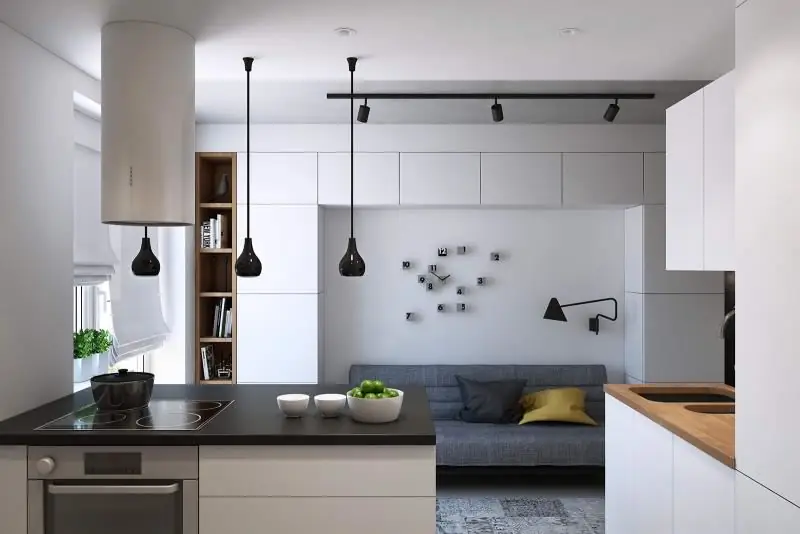
Minimalism style principles, choice of shades and materials. Features of the arrangement of the kitchen in the style of minimalism, design rules and decor ideas
The Interior Of The Kitchen And Living Room In A Loft Style In An Apartment And A Country House: Examples Of Design Design, Choice Of Color And Material, Decoration, Photo
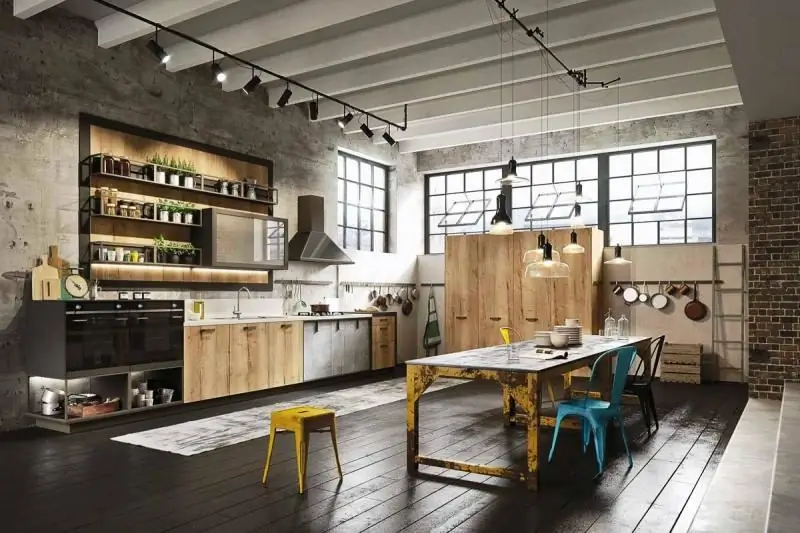
The main features of the loft style and how to decorate the kitchen in such a design. The choice of materials, colors and textures for finishing. Loft-style lighting and decor for the kitchen
High-tech Kitchen And Living Room Interior: Examples Of Design, Choice Of Colors And Materials, Decoration, Furniture, Accessories, Photos, Videos
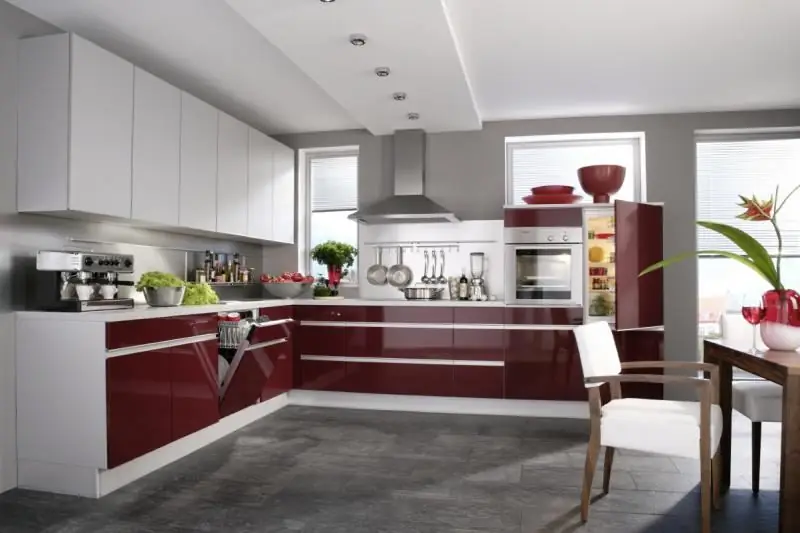
High-tech style features and how to decorate the kitchen interior. How to choose colors and materials for design and how to combine other styles with high-tech
Kitchen Interior In French Style: Examples Of Design, Choice Of Color And Material, Decoration, Furniture, Accessories, Photos, Videos
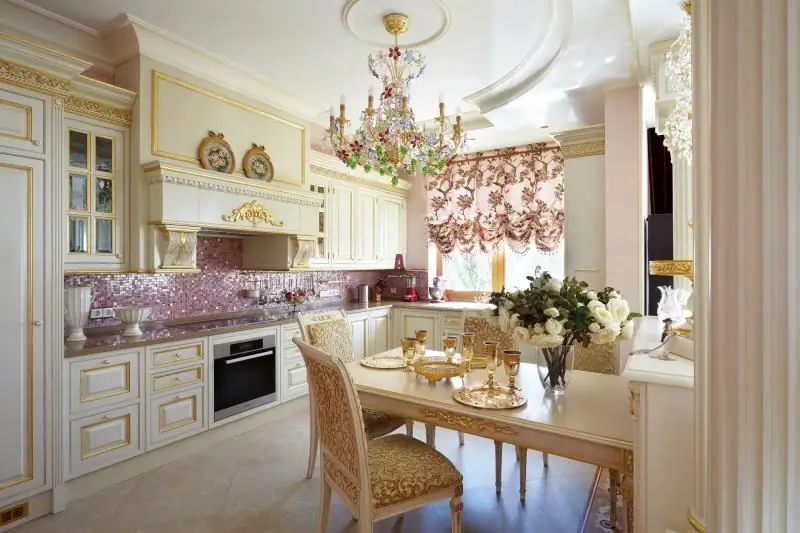
What is a French kitchen interior. The main types and signs. How to design a modern French kitchen
Eco-style Kitchen Interior: Examples Of Design, Choice Of Color And Material, Decoration, Furniture, Accessories, Photo, Video
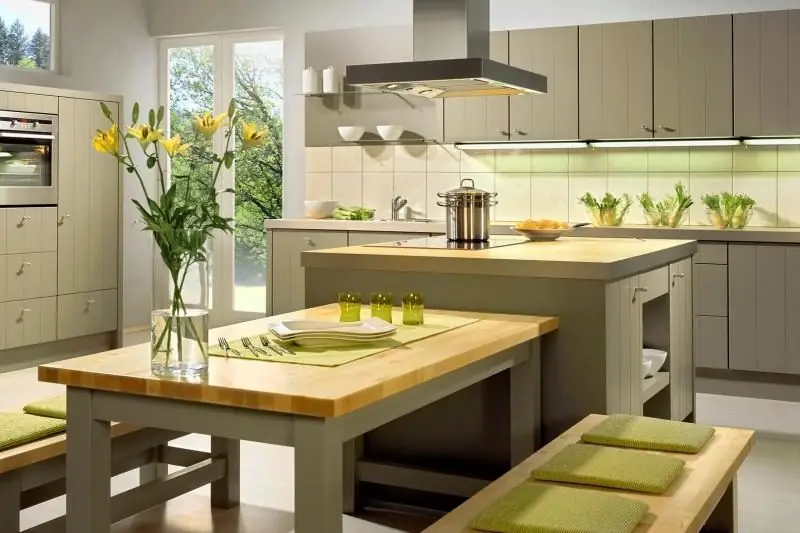
The main features of the eco style and what materials are suitable for kitchen design. The advantages and disadvantages of eco style, as well as the choice of decor and lighting for the kitchen
